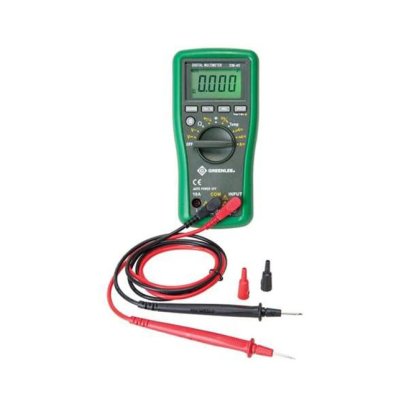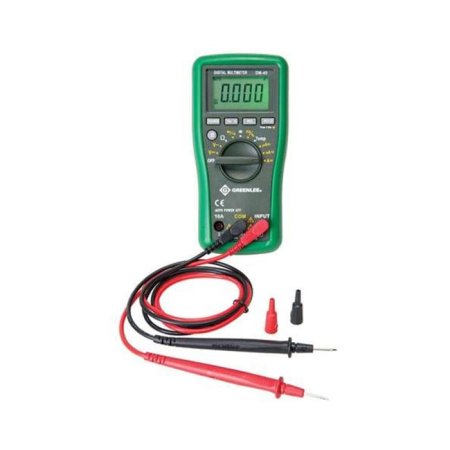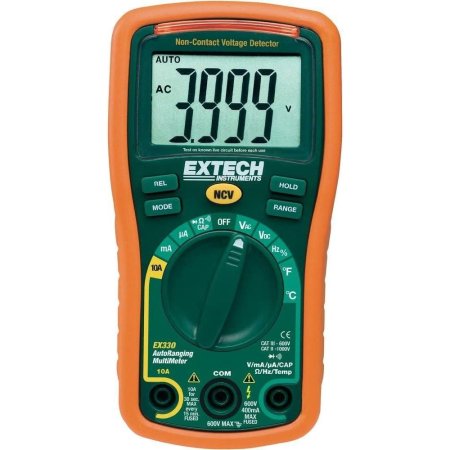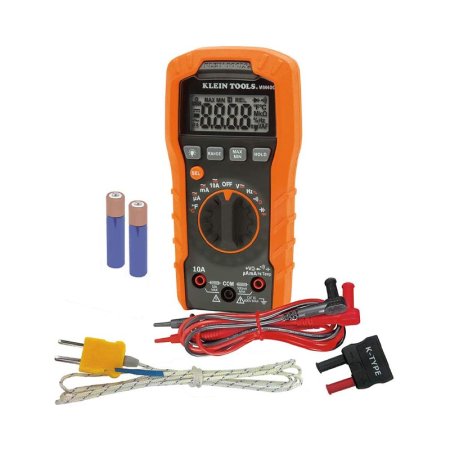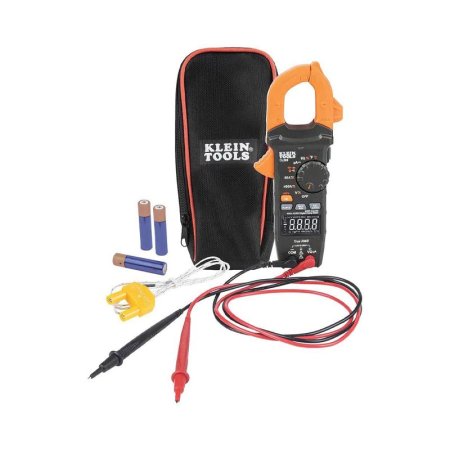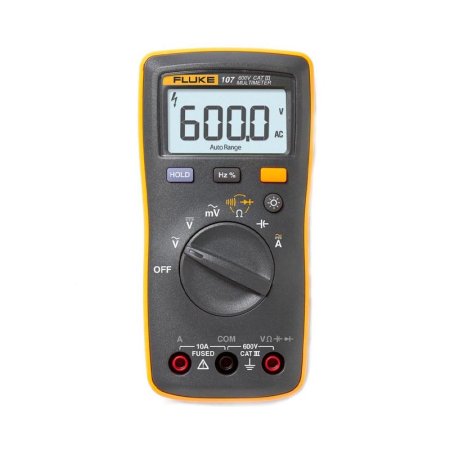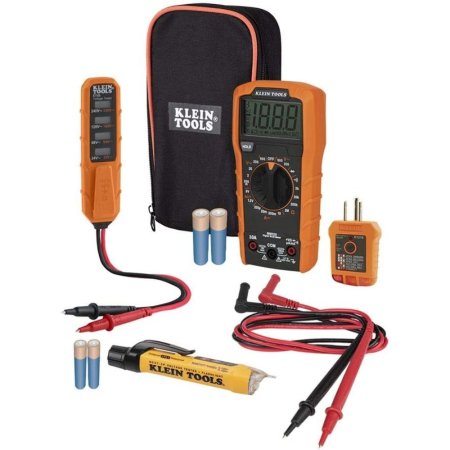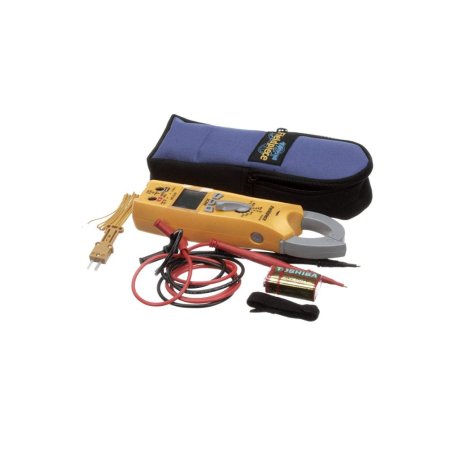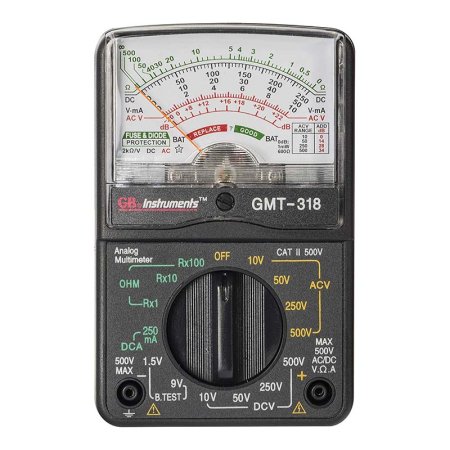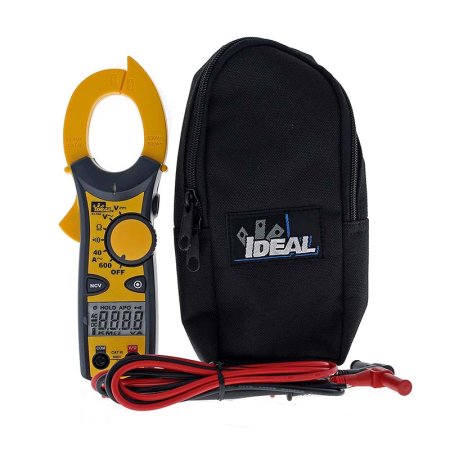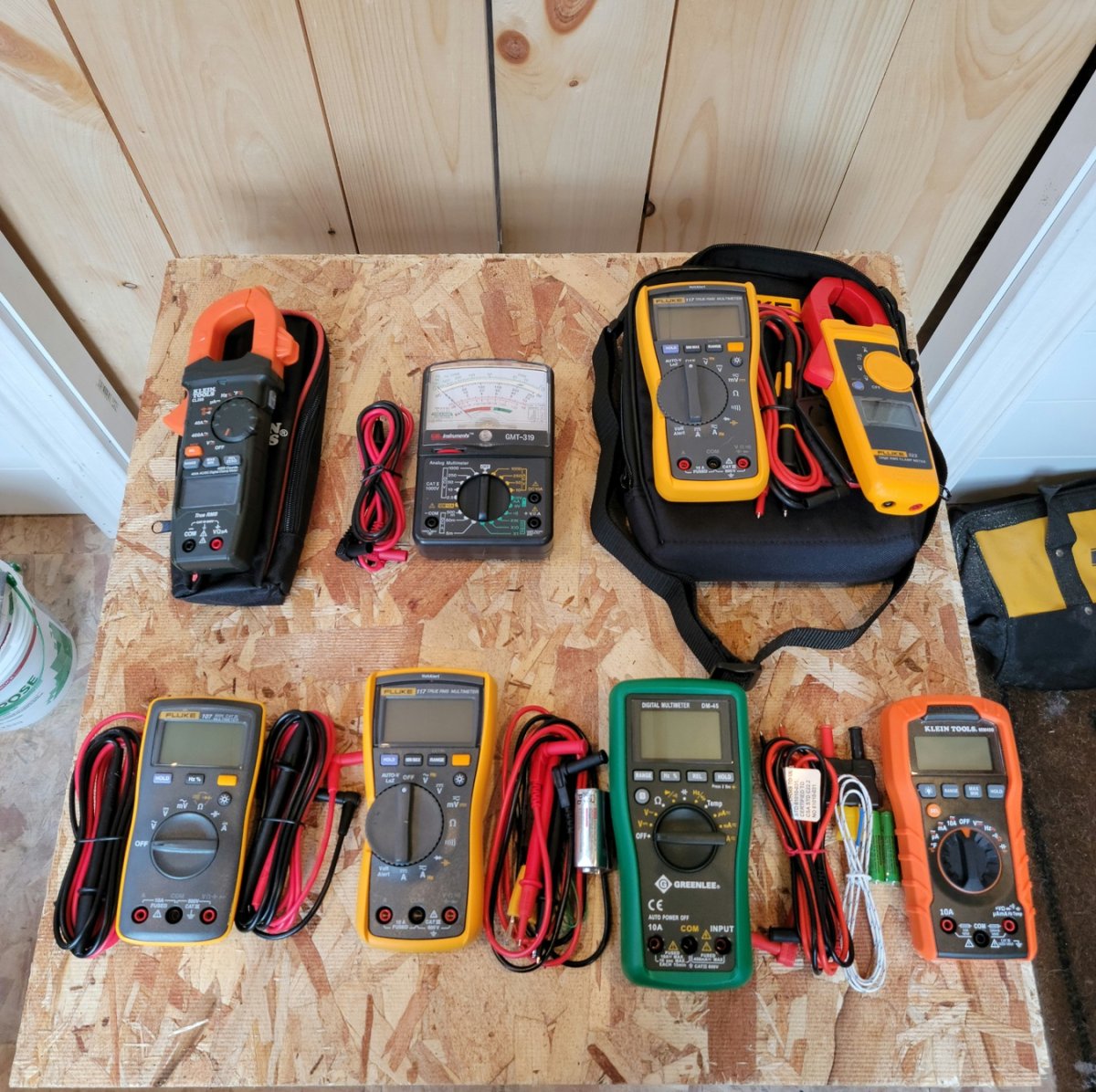
We may earn revenue from the products available on this page and participate in affiliate programs. Learn More ›
From testing batteries to determining the amount of voltage in an electrical circuit, the multimeter is a standard diagnostic tool often found in electricians’ tool kits. But multimeters also come in handy for DIYers who want to test their home’s wiring or repair electrical appliances. They’re also practical for hobbyists—folks who tinker with electronic circuits when building the likes of pedometers, motors, and humidity sensors.
Prior to the development of today’s versatile multimeters (also called multitesters), separate meters were necessary to test circuits for voltage (voltmeter), resistance (ohmmeter), and current (ammeter). Now, multimeters combine those testing capabilities into a single tool, letting you perform a variety of electrical tests with one device.
A wide variety of multimeters are available, designed for both basic and advanced circuit testing and geared toward different projects or specialties. While a DIYer can usually get by with a no-frills tool, electricians and HVAC pros will benefit from some of the advanced options found on professional models.
Our favorite multimeter is the Greenlee DM-45 4,000-Count 600V Digital Multimeter. We like it because of its multifunctional design; gripped rubber cover; and bright, backlit display. We performed hands-on testing with some of the best multimeters, so keep reading to learn about what we found to help you choose the right tool for you.
- BEST OVERALL: Greenlee DM-45 4,000-Count 600V Digital Multimeter
- RUNNER-UP: Extech EX330 12-Function Mini Multimeter
- BEST BANG FOR THE BUCK: Klein Tools MM400 Auto-Ranging Digital Multimeter
- BEST CLAMP: Klein Tools CL390 AC/DC Digital Clamp Meter
- BEST COMBO KIT: Fluke 117/323 Digital Multimeter and Clamp Meter Kit
- BEST FOR BASIC DIY: Fluke 107 Pocket Digital Multimeter
- BEST STARTER KIT: Klein Tools MM320KIT Digital Multimeter Test Kit
- BEST FOR HVAC: Fieldpiece SC260 400A Compact Clamp Meter
- BEST ANALOG: Gardner Bender GMT-318 6-Function Analog Multimeter
- ALSO CONSIDER: Ideal Industries 61-744 600A AC Clamp-Pro Clamp Meter
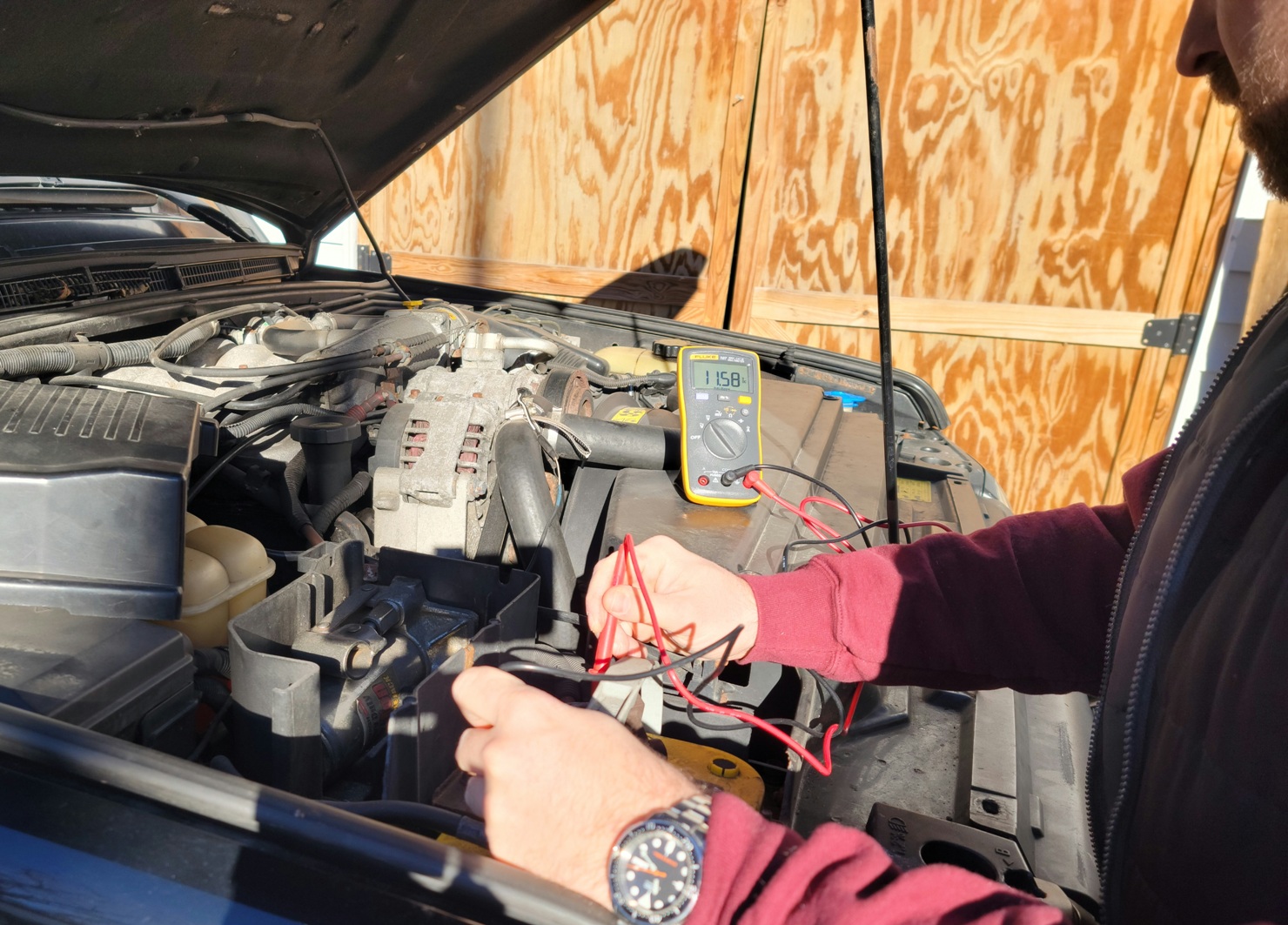
How We Tested the Best Multimeters
Full disclosure: We are not electricians or HVAC technicians. Our goal was to test these meters to the degree that the average DIYer would use their meter. Learning how to use these meters to their full capacity and having the serious electrical infrastructure available to test some of those functions is outside the scope of this article. With that said, we put each of these meters through their paces.
First, we set up a testing station with some outlets, wires, appliances, and a couple of batteries. We checked each of the basic functions, like alternating current (AC) and direct current (DC) voltage, resistance, continuity, and the jaws on the clamp meters. We worked in the dark as well as the bright sunlight so we could see how well the displays performed.
We also tested these meters in the driveway to see how they’d do troubleshooting the wiring in an older vehicle. We did simple tests like battery loads as well as testing across some less-than-factory wiring jobs. In the process, we compared the meters’ stands, leads, and functions as they apply to automotive work.
Between all these tests, we had a good idea of what the average DIYer can expect from each of these models. Some models didn’t make the grade, while others excelled.
Our Top Picks
There’s actually a lot to know about choosing the best multimeter—and while DIYers will find ample info in this guide, it might still feel challenging to find the right tool. To help simplify shopping, we performed hands-on testing with some of the best popular multimeters. Keep key considerations in mind when comparing the following list of our favorite multimeters.
Note: All the meters in our test feature auto-ranging AC and DC capability.
Best Overall
Greenlee DM-45 4,000-Count 600V Digital Multimeter
Product Specs
- Style: Digital
- Functions: Voltage, amperage, resistance, frequency, capacitance, duty cycle, temperature
- Included probes: Test leads
This digital multimeter from Greenlee features auto-ranging capability to do away with guessing at the current being tested. It comes with standard black and red probes as well as a built-in stand. The Greenlee operates on a 9-volt battery (included) and tests AC/DC voltage, resistance, and current in addition to capacitance, duty cycle, and temperature. Its backlit display is a bright green color that makes reading it a breeze.
The first thing we noticed about the Greenlee during testing was its grippy rubber cover, which can slip on and off easily for cleaning. We liked the cutout in the back for the built-in stand and screw hook, making it a snap to set the meter atop an engine or hang it from a screw or nail. The green backlight proved to be the brightest of all models tested, with the green color offering a nice contrast. The only things missing that we would’ve liked are a thermocouple attachment to take advantage of the temperature sensor and a carrying case.
What We Like
- Grippy rubber cover allows the user to maintain a solid hold on the meter in a variety of conditions
- Bright backlight with strong contrast lets you see the readings clearly, even in the dark
- Built-in stand and hanger hook make positioning this model easier than others, allowing you to test with both hands
What We Don’t Like
- No case or thermocouple included
Get the Greenlee multimeter at Amazon or Acme Tools.
Runner-Up
Extech EX330 12-Function Mini Multimeter
Product Specs
- Style: Digital
- Functions: AC and DC voltage, resistance, AC and DC amperage, frequency, temperature (Fahrenheit and Celsius), capacitance, diode testing, noncontact testing, continuity, and duty cycle
- Included probes: Test leads and thermocouple
Folks looking for an all-around capable multimeter with all of the basic functions will want to consider the EX330 from Extech. This model comes with a set of test leads as well as a K-type thermocouple to provide temperature readings on motors or even airflow. You can also set the EX330 to autorange, selecting the correct measurement range for whatever circuit being tested. There is a noncontact voltage tester via a sensor in the top of the meter for quickly checking for power as well as a 15-minute automatic shutoff to save on the two AAA batteries.
As for functions, the EX330 offers AC and DC voltage, resistance, AC and DC amperage, frequency, temperature (Fahrenheit and Celsius), capacitance, diode testing, noncontact testing, continuity, and duty cycle.
While this is an excellent all-around meter, there are three things we especially liked about the EX330: the display, the temperature sensor, and the noncontact tester. The screen is large, with 1-inch-tall digits that are easy to read quickly and without mistakes. The temperature sensor works well and quickly grabs measurements rather than taking excessively long to even out. Plus, the noncontact sensor proved to be excellent as it beeps rather than making loud buzzing sounds like some other meters’ built-in testers do. The grippy exterior and built-in stand are also assets. Our only complaint is that there’s no backlight; if there was, the EX330 might’ve taken the top spot.
What We Like
- Large screen makes it easy to quickly and accurately observe the reading
- Built-in NCV (noncontact tester) makes a clear and audible beep, unlike some of the competitors
- It comes with a thermocouple kit for testing temperatures on motors and ductwork
What We Don’t Like
- It doesn’t have a backlight to make reading the screen easier in dark scenarios
Get the Extech multimeter at Amazon or Teledyne Flir.
Best Bang for the Buck
Klein Tools MM400 Auto-Ranging Digital Multimeter
Product Specs
- Style: Digital
- Functions: Voltage, amperage, resistance, frequency, capacitance, duty cycle, temperature
- Included probes: Test leads and thermocouple
Klein Tools is a staple in the electrical tool world, and this digital multimeter is a good indication of why. This meter tests for volts, resistance, and amperage as well as frequency, duty cycle, capacitance, and temperature, allowing it to serve more purposes than the average DIYer may ever need. It comes with a set of test leads as well as a thermocouple probe for checking temperatures. The screen is easy to read and features a backlight for working in darker spaces.
We found the Klein Tools digital multimeter to be one of the easiest models on the list to use. First, switching between DC and AC on most readings was accomplished with just the push of a button. Next, we liked that despite having all the functions we could need, the multimeter was compact, making it easy to hold and store. Also, the backlit display was incredibly easy to read. Our biggest complaint was that it doesn’t come with a carrying case or a magnetic strap, but the budget-friendly price compensates for that.
What We Like
- Easy to use thanks to the auto-ranging sensor that automatically chooses the correct settings
- Excellent backlit digital display makes for clear and easy reading of measurements in dark settings
- Affordable price; a quality multimeter needn’t break your tool budget!
What We Don’t Like
- It doesn’t come with a carrying case, so you’ll need to be careful when placing it in a tool box or bag
Get the Klein Tools MM400 multimeter at Amazon or The Home Depot.
Best Clamp
Klein Tools CL390 AC/DC Digital Clamp Meter
Product Specs
- Style: Digital clamp
- Functions: Voltage, amperage, resistance, frequency, capacitance, duty cycle, temperature, clamp, noncontact
- Included probes: Test leads, thermocouple, noncontact
Anyone looking for a clamp meter for testing will be interested in checking out this model from Klein Tools. The CL390 digital clamp meter features a side-mounted trigger that opens the jaws for testing one conductor at a time, as well as a jaw-mounted noncontact tester on the end. The kit also includes standard testing leaders for amperage, voltage, resistance, duty cycle, capacitance, and diode testing. For temperature tests, there’s a K-type thermocouple that installs easily for fast readings.
This clamp meter proved to be pretty convenient. For one thing, we liked that it’s easy to test with one hand (once we split the wire on our office fan), but it’s also a handy way to hang the meter while working with the leads. The noncontact tester was also a big plus, as we could quickly check for voltage on wires and devices. We also liked the negative display, which was easy to read. The average DIYer might not need a clamp meter, but the design does allow it to serve as an excellent hanging clip.
What We Like
- Easy 1-handed operation thanks to the clamp meter’s design
- Hangs from the clamp from a wire or support beam for hands-free working with leads
- A noncontact tester is a big plus, allowing you to stay safe when working with unknown conditions
What We Don’t Like
- Might not be necessary for a DIYer who won’t measure individual conductors
Get the Klein Tools CL390 multimeter at Amazon, The Home Depot, or Acme Tools.
Best Combo Kit
Fluke 117/323 Digital Multimeter and Clamp Meter Kit
Product Specs
- Style: Digital and clamp
- Functions: Voltage, amperage, resistance, frequency, capacitance, duty cycle, clamp
- Included probes: Test leads
Can’t decide between a multimeter and a clamp meter? This 117/323 kit from Fluke has both. The 117 multimeter features voltage, amperage, resistance, and continuity functions as well as a totally automatic voltage test setting for AC or DC voltage. It also features a noncontact setting that alerts to the presence of voltage. The 323 clamp meter has jaws for testing single conductors as well as terminals for attaching standard leads.
This kit pretty much covered all the bases for us during testing. We liked how easy the clamp meter was to use, and it served as an excellent clip for hands-free work. We really liked the multimeter’s functions—specifically, the noncontact tester that alerted us any time it was near an energized outlet or wire. The leads on this particular kit were outstanding as they spin in hand to expose more of the lead, allowing us to switch between small points for electronics to longer points for outlets and other heavier-duty work. The only real issue, which seems like quite an oversight, is that neither of these meters has temperature functions.
What We Like
- Excellent leads allow you to adjust the length of the exposed contact
- Provides virtually all the functions the average DIYer could need during most electronics repairs or electrical projects
- A noncontact tester is convenient and keeps users safe when working with unknown circuit conditions
What We Don’t Like
- Lacks a temperature function for checking ductwork or motor temperatures
Get the Fluke 117/323 multimeter at Amazon.
Best for Basic DIY
Fluke 107 Pocket Digital Multimeter
Product Specs
- Style: Digital
- Functions: Voltage, amperage, resistance, capacitance
- Included probes: Test leads
Those who are in the market for a multimeter that will serve most of their purposes without being overly complicated will want to take a look at the Fluke 107 pocket digital multimeter. It has a simple design with functions for testing voltage, amperage, resistance, capacitance, and even frequency. It comes with a basic set of test leads as well as a magnetic strap that can hang from an electrical box or pipe for hands-free use.
The Fluke 107 is not the fanciest model in our lineup, but we truly enjoyed its simplicity. It easily tests voltage, amperage, and resistance and has a separate switch for continuity—those functions alone are more than what the average DIYer may ever need. We like that it has a backlight and a large screen, and the magnetic strap can double over and act as a stand. Our main complaint is the lack of both a carrying case and storage clips in the back for the leads, so storing the meter could be an issue.
What We Like
- Simple design with plenty of basic functionality keeps things uncomplicated for the basic DIYer
- Large display with backlight makes getting accurate readings easier, even in dark conditions
- Magnetic strap acts as a stand to provide 2 methods of hands-free testing
What We Don’t Like
- Storage is an issue, as it doesn’t come with a carrying case or a spot to snap the leads into
Get the Fluke 107 multimeter at Amazon or Lowe’s.
Best Starter Kit
Klein Tools MM320KIT Digital Multimeter Test Kit
Product Specs
- Style: Digital
- Functions: AC and DC voltage, current, resistance, battery testing, diode testing, and continuity (but comes with additional tools)
- Included probes: Test leads
Consider getting a jump start on assembling that electrical testing tool kit with the Klein Tools MM230KIT. This test kit comes with a multimeter, a noncontact pen tester, an outlet tester, a contact voltage tester, and a carrying case for it all. The meter offers AC and DC voltage, current, and resistance as well as testing batteries, diodes, and continuity. The voltage tester displays voltage range, the outlet tester displays wiring configuration and trips ground-fault circuit interrupters (GFCIs), and the pen tester alerts to voltage without having to touch the wire or outlet.
Beyond the different tools, the meter comes with a set of test leads. The leads also snap into two lead holders on the back of the meter for easy storage. Novice DIYers should appreciate being able to store the entire set in the carrying case, knowing they have everything they need the next time they have a project.
The Klein’s screen is large and extremely easy to read (in daylight conditions; it doesn’t have a backlight). We consider the screen size a huge perk, particularly when compared to some of the smaller screens in models we tested. We liked that it came with ample accessory tools as well, as they are the kinds of things we had to purchase separately when we started building our DIY kits years ago. Our one issue is that this model lacks auto-ranging; navigating the multiple settings on the dial might get confusing for some users.
What We Like
- The MM320’s massive screen made reading the voltage and amperage levels a breeze
- It comes with many of the tools that we bought separately as we started our DIY electrical kits
- Onboard storage for test leads and carrying make for convenient storage and organization
What We Don’t Like
- It does not have a backlight, which makes it hard to read in low-light conditions
Get the Klein Tools MM320KIT multimeter at Amazon, The Home Depot, or Acme Tools.
Best for HVAC
Fieldpiece SC260 400A Compact Clamp Meter
Product Specs
- Style: Digital
- Functions: AC and DC voltage, amperage, and resistance, noncontact tester, clamp meter, K-type temperature sensor, diode testing, capacitance
- Included probes: Testing leads, thin test leads, and thermocouple
Whether it’s checking ductwork, motor amperage, or voltage through a wire, the Fieldpiece SC260 has the HVAC professional covered. This model boasts many features, including AC and DC amperage, voltage, and resistance as well as a noncontact tester, a clamp meter, a K-type temperature sensor, diode testing, capacitance, and more. It comes with the meter, a carrying case, test leads, and a K-type thermocouple. It also has a backlight to make reading the display easier and a magnet on the back for hanging off of a metal beam or box to keep hands free for testing with the leads.
The SC260 from Fieldpiece is specifically designed for HVAC technicians, but we found it will work quite well for DIYers too. The built-in magnet makes it possible to safely attach it to a control box or AC unit, and the user can then manipulate the test leads with both hands. The backlight was bright and, despite the screen being relatively small, easy to read. Equally easy was using the model, as auto-ranging minimizes the settings and buttons on the unit. The noncontact tester beeps less annoyingly than other models that buzz loudly; however, it did seem overly sensitive, occasionally alerting when there wasn’t electricity within 8 to 10 inches.
What We Like
- Backlight makes reading this model in low-light conditions easier than some other models
- Built-in magnet makes hanging it from any metal surface a possibility, allowing hands to manipulate test leads
- Simple design means you’ll be able to quickly select the reading you want while the auto range provides a reading
What We Don’t Like
- Noncontact tester is sometimes a bit sensitive and activates for no apparent reason
Get the Fieldpiece multimeter at Amazon or TruTech.
Best Analog
Gardner Bender GMT-318 6-Function Analog Multimeter
Product Specs
- Style: Analog
- Functions: AC and DC voltage, amperage, and resistance; battery and fuse testing
- Included probes: Testing leads
Folks who’d prefer to use an analog meter for their sensitive electronics, affordability, and all-around simplicity can check out the GMT-318 from Gardner Bender. This model has six functions, including AC and DC voltage, current, and resistance. It can also test batteries, fuses, and more. It’s a basic device that’s easy to use, and it comes with a short set of test leads.
We liked that the GMT-318’s display was easy to read at a general level. The model itself was also easy to use, pointing the needle in the general area of the functions measured. The different functions are color-coded (as on most analog meters) Switching back and forth between functions didn’t require moving leads like some models do, and doing so was easy. The tasks we felt this meter performed best at were quickly checking batteries for charge level and working on small electronics, since it can detect very low voltage. The test leads are relatively short (around half the length of some other models), which made field work (testing outlets, in our case) a bit less convenient than we would’ve liked.
What We Like
- Basic analog device makes it simple to use and understand for general electrical readings
- Switching between functions is very easy and doesn’t require moving testing leads
- It can detect low voltage, so it’s great for testing batteries and low-voltage electronics
What We Don’t Like
- Testing leads are quite short and can make reaching outlets or devices more difficult
Get the Gardner Bender multimeter at Amazon.
Also Consider
Ideal Industries 61-744 600A AC Clamp-Pro Clamp Meter
Product Specs
- Style: Digital
- Functions: AC and DC voltage and amperage, resistance, noncontact tester, clamp meter
- Included probes: Test leads
The Ideal Industries 61-744 clamp meter is another model we deem worthy of consideration. It has a streamlined design that can measure AC and DC voltage, resistance, and amperage. It can also test continuity, and it has a clamp meter that allows it to check the current in a single leg of wire. In terms of accessories and probes, this model comes with a simple set of test leads and a carrying case with a user manual inside.
What we appreciated most about the Ideal 61-744 is its simple, streamlined design. The model itself isn’t big and bulky, and the different settings are clearly displayed for quick adjustments. We also liked that it comes with a noncontact tester, although the tester alerts with an obnoxious buzzing noise (it’s also sensitive, making live circuits hard to pinpoint). We would’ve liked to have seen a backlight as well. Still, this model’s size is also considerably smaller (around an inch) than some other clamp meters, which could make a difference for some users.
What We Like
- Simple design makes clicking the function wheel into the correct position a breeze
- Built-in noncontact tester is great for quickly checking whether a device is live or not
- Streamlined design is smaller than most other clamp meters, making it easier to handle and store
What We Don’t Like
- The noncontact tester’s alert is a loud, annoying buzzing noise; plus, it’s sensitive and alerts often
- It doesn’t have a backlight
Get the Ideal Industries multimeter at Amazon or Cooper Electric.
ALSO TESTED
We also tested the Gardner Bender GMT-319 multimeter, but it didn’t meet our standards. First, it was confusing to use as compared to the digital models. Worse, it was hard to even get a reading with this tool. We checked the fuses (luckily, we had a multimeter on hand to do so), and they were fine. We did eventually blow the fuses as we were trying to get any clear reading from this model, however. This solidified that there are just too many inexpensive digital models on the market to deal with a fidgety analog model like this one.
Jump to Our Top Picks
What to Consider When Choosing a Multimeter
Choosing the best multimeter requires quite a bit of knowledge about these electrical testing tools, including the style, the features, the accessories, and the leads. Read on as we break down some of the most important considerations to keep in mind when shopping for one of these tools.
Basic and Advanced Functions
For the greatest versatility, make sure the multimeter can test both types of electrical current: AC, the electricity that flows through the outlets in the home; and DC, the electricity found in batteries. Additionally, in order to qualify as a multimeter, the tool must perform at least two of the following three basic electrical tests:
- Current: The electricity’s rate of flow
- Voltage: The difference in electric current between two given points
- Resistance: How much the material carrying the energy, such as wires, resists electrical flow
In addition to testing voltage, resistance, and current, advanced digital multimeters often come with the ability to test the following:
- Capacitance: The ability to store an electrical charge
- Temperature: The physical warmth of the circuit (often in both Fahrenheit and Celsius)
- Frequency: The rate of electrical occurrence (measured in hertz)
Analog Versus Dial Display
The classic analog multimeter features a dial with a needle (like the old-time speedometer on a car). For some, this type of readout is easier to see, especially in bright sunlight when numbers on a digital display can be difficult to decipher. Shoppers won’t find a large selection of analog meters anymore, but they’re typically inexpensive, ranging from $10 to $70, and while they can perform the three basic circuit tests, they don’t have the capability to perform more advanced testing.
Most multimeters on the market today are digital, and they’re a bit pricier, ranging from $20 to $500 or even more based on quality and precision. Some digital multimeters come with a backlit screen that makes the display easier to see in bright light, and some include an auto shutoff feature that turns the meter off after a few minutes of nonuse.
Auto-Range Function
Figuring out the approximate range of the electrical current being tested with a manual range multimeter can be a time-consuming process. To test resistance, for example, you must first estimate the approximate ohms (Ω) of the current by turning the dial to a specific ohms range and then continue clicking manually until the multimeter gives a readout. A multimeter with an auto-range function (available only on digital models) will save time since all you have to do is select the type of test to perform (voltage, resistance, or current). The meter will then automatically detect the correct range by scanning through all the range options until it matches the right range to the circuit, and a readout appears immediately.
Probes and Accessories
Most multimeters include a set of standard red and black probes for performing basic tests, and others come with additional alligator clips for attaching the probes to wires or battery terminals. A magnetic case or sling is a handy accessory that allows you to attach the multimeters to something metal, such as a cabinet or the undercarriage of a car, letting you see the readout and still have both hands free for testing. These clips, probes, and cases are also available at hardware and home improvement stores.
FAQs
Those who still want more information on the best multimeters should read on for answers to some of the most frequently asked questions about these tools.
Q. Which multimeter is best for beginners?
In our opinion, the Fluke 107 multimeter is the best multimeter for beginners, as it’s easy to use and has most of the functions a DIYer will need.
Q. What type of multimeter is best for home use?
A standard multimeter is likely the best type for home use. This Greenlee multimeter checks almost all the boxes.
Q. Is an analog or digital multimeter more accurate?
Digital multimeters are much more accurate but only because they’re much easier to read. And with the price difference being so minute on the affordable end of both meter types, a digital meter is almost always the way to go. Still, analog meters are almost always much less expensive than high-end models.
Meet the Tester
Tom Scalisi is a full-time DIY and construction writer for many of the largest websites in the industry, including Bob Vila, This Old House, Family Handyman, and Forbes as well as his own pest control blog. He spent years in the trades, from building maintenance to carpentry and contracting, and he’s used his fair share of multimeters, pen testers, and other electrical tools in the process.
Additional research provided by Glenda Taylor.
